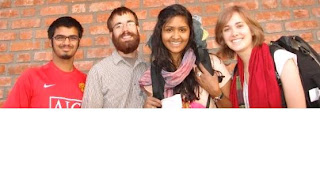
I have spent the past few days developing instructional materials to encourage teachers in the US to teach their students about the Bhopal tragedy as a part of Social studies curriculum. While browsing other examples of social justice teaching materials, I came across an awesome video and accompanying site, “The Story of Stuff”. This video conveys more concepts and information about our global economic system than I learned in 6 years at university – and it is aimed at middle and high school students! It is simple without being patronizing, and clear but full of weighty ideas. It manages to connect the dots between the major trends of the last century – environmental degradation, third world poverty, the growth of corporate power, pollution and the resulting health problems, over-consumption in the developed world, and the explosion of marketing and advertising in the last half-century – and explains how these trends are all part of the same global system, the system that makes it possible for us to have so much stuff.
Watching this simple little video affected me in two ways. First, I realized that the Bhopal tragedy can not be taught without the proper context. Everyone in the world should be aware of the specific events that took place in 1984 and the tragic aftermath, but Bhopal must be viewed as one of many disastrous consequences of the global economic and political system, not as a isolated industrial accident. If studied in isolation, it is easy to conclude that improved safety standards can prevent a future accident – case closed. When studied in the appropriate context, it is impossible to ignore the larger problems that led to the disaster and its tragic aftermath. Bhopal can be used to illustrate so many abstract academic concepts;

Why was a US factory put into a poor section of an Indian city? Globalization and the trans-national movement of capital (economics), a growing market for synthetic fertilizers (agriculture), and environmental discrimination against the poor (sociology). What happened on the night of Dec 3rd, 1984? Lax safety restrictions due to poor management (organizational behavior), poisonous gas killed thousands with no emergency assistance (public heath). Why have the victims not received adequate compensation? No international body to penalize trans-national corporations (international relations), poor corporate ethics (economics), and prejudice against the poor and minority groups (sociology).
The “Story of Stuff” had another affect on me; it increased my desire to become an educator. I am passionate about social, environmental, and economic issues (an obvious fact considering my recent postings), so having a captive audience to educate about these issues is the perfect career move. Obviously I'll have to teach more than social justice issues, but a good teacher has a responsibility to teach his or her conscience. I can see myself becoming a teacher because informing the next generation about the world's problems is vitally important – but, of course, having summers off helps too.
 The original intent of this post was to inform you how to help the Bhopalis cause. There are some specific things that can help, but I really believe that educating yourself about the tragedy, especially its economic context, is the most important way to express solidarity with the victims. Of course, donations to Sambhavna Clinic and the International Campaign for Justice in Bhopal are always appreciated. There is also a really awesome fundraiser, “Cycle Bhopal” which is a week-long bike ride across central India in November. Since most people can't afford this, the ICJB lists 20 Things You Can Do to Make Dow Responsible. On the 25th anniversary (December 3rd, 2009) there will be many opportunities to get involved and, hopefully, a lot of media focus on the issue.
The original intent of this post was to inform you how to help the Bhopalis cause. There are some specific things that can help, but I really believe that educating yourself about the tragedy, especially its economic context, is the most important way to express solidarity with the victims. Of course, donations to Sambhavna Clinic and the International Campaign for Justice in Bhopal are always appreciated. There is also a really awesome fundraiser, “Cycle Bhopal” which is a week-long bike ride across central India in November. Since most people can't afford this, the ICJB lists 20 Things You Can Do to Make Dow Responsible. On the 25th anniversary (December 3rd, 2009) there will be many opportunities to get involved and, hopefully, a lot of media focus on the issue.Honestly, I don't expect you to picket a Dow office or plan a fundraiser, but I do hope that information about the Bhopal tragedy has led to increased awareness of the fundamental flaws of our global economic system; we need to rethink a system which allowed an organization to kill thousands of innocent people, poison thousands more, avoid the legal and financial consequences, and still operate successfully. Many of the Bhopal victims are illiterate, uneducated, and isolated from the world, but they have an sophisticated and painful understanding of the global economic system; it controls nearly every aspect of their lives but is not willfully blind to their needs, demands, or wishes.
I have reached the half-way point of my Bhopal stay. In about three weeks I'll be in the only other country as overwhelmingly large and complex as India - The People's Republic of China. I'll have to figure out how to get around all the censors and walls that the Chinese government uses to prevent people from putting controversial political messages on the internet. Don't be suprised if my posts from China are a little more tempered and mild - maybe even avoiding politics all together. I'm sure it is irrational to fear becoming a political prisoner, but China doesn't have the best human rights record and I don't have the best record of keeping my mouth shut. But in meantime I'll enjoy the relative freedom of India.









